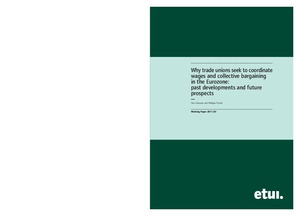Why trade unions seek to coordinate wages and collective bargaining in the eurozone: past developments and future prospects
"In the run-up to European Monetary Union (EMU) trade unions across Europe began to coordinate their bargaining policies transnationally. This paper provides an overview of the efforts made by European and national trade unions to coordinate collective bargaining and wage formation at the secto...
| Main Authors: | , |
|---|---|
| Institution: | ETUI-European Trade Union Institute |
| Format: | TEXT |
| Language: | English |
| Published: |
Brussels
2011
ETUI |
| Subjects: | |
| Online Access: | https://www.labourline.org/KENTIKA-19177836124919950189-Why-trade-unions-seek-to-coord.htm |
| Summary: | "In the run-up to European Monetary Union (EMU) trade unions across Europe began to coordinate their bargaining policies transnationally. This paper provides an overview of the efforts made by European and national trade unions to coordinate collective bargaining and wage formation at the sectoral and intersectoral levels to date, embedding them in the broader framework of a European industrial relations system. It concludes with a brief discussion of the likely implications for the trade unions’ transnational bargaining coordination policies of the plans to further centralise economic policies in the Eurozone. " |
|---|---|
| Physical Description: | 32 p. Paper Digital |

